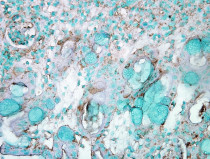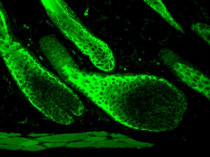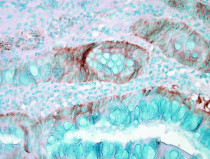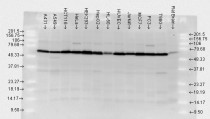ARG22291
anti-Hsp 70 antibody
anti-Hsp 70 antibody for ELISA,ICC/IF,IHC-Frozen sections,IHC-Formalin-fixed paraffin-embedded sections,Immunoprecipitation,Western blot and Human,Mouse,Rat,Bovine,Carp,Dog,Fish,Guinea pig,Hamster,Monkey,Pig,Plant,Shark,Sheep
Overview
| Product Description | Rabbit Polyclonal antibody recognizes Hsp 70 |
|---|---|
| Tested Reactivity | Hu, Ms, Rat, Bov, Carp, Dog, Fsh, Gpig, Hm, Mk, Pig, Plnt, Shark, Sheep |
| Tested Application | ELISA, ICC/IF, IHC-Fr, IHC-P, IP, WB |
| Specificity | Detects a ~70kDa. May cross-react with HSC70 at lower dilutions. |
| Host | Rabbit |
| Clonality | Polyclonal |
| Target Name | Hsp 70 |
| Antigen Species | Human |
| Immunogen | Full length HSP70 protein |
| Conjugation | Un-conjugated |
| Alternate Names | Heat shock 70 kDa protein 1A; HSPA1; HSP70I; Heat shock 70 kDa protein 1; HSP70-1A; HEL-S-103; HSP70.1; HSP72; HSP70-1 |
Application Instructions
| Application Suggestion |
|
||||||||||||||
|---|---|---|---|---|---|---|---|---|---|---|---|---|---|---|---|
| Application Note | * The dilutions indicate recommended starting dilutions and the optimal dilutions or concentrations should be determined by the scientist. |
Properties
| Form | Liquid |
|---|---|
| Purification | Affinity purification with immunogen. |
| Buffer | PBS (pH 7.4), 0.09% Sodium azide and 50% Glycerol |
| Preservative | 0.09% Sodium azide |
| Stabilizer | 50% Glycerol |
| Concentration | 1 mg/ml |
| Storage Instruction | For continuous use, store undiluted antibody at 2-8°C for up to a week. For long-term storage, aliquot and store at -20°C. Storage in frost free freezers is not recommended. Avoid repeated freeze/thaw cycles. Suggest spin the vial prior to opening. The antibody solution should be gently mixed before use. |
| Note | For laboratory research only, not for drug, diagnostic or other use. |
Bioinformation
| Database Links | |
|---|---|
| Gene Symbol | HSPA1A |
| Gene Full Name | heat shock 70kDa protein 1A |
| Background | This intronless gene encodes a 70kDa heat shock protein which is a member of the heat shock protein 70 family. In conjuction with other heat shock proteins, this protein stabilizes existing proteins against aggregation and mediates the folding of newly translated proteins in the cytosol and in organelles. It is also involved in the ubiquitin-proteasome pathway through interaction with the AU-rich element RNA-binding protein 1. The gene is located in the major histocompatibility complex class III region, in a cluster with two closely related genes which encode similar proteins. [provided by RefSeq, Jul 2008] |
| Function | In cooperation with other chaperones, Hsp70s stabilize preexistent proteins against aggregation and mediate the folding of newly translated polypeptides in the cytosol as well as within organelles. These chaperones participate in all these processes through their ability to recognize nonnative conformations of other proteins. They bind extended peptide segments with a net hydrophobic character exposed by polypeptides during translation and membrane translocation, or following stress-induced damage. In case of rotavirus A infection, serves as a post-attachment receptor for the virus to facilitate entry into the cell. Essential for STUB1-mediated ubiquitination and degradation of FOXP3 in regulatory T-cells (Treg) during inflammation. [UniProt] |
| Cellular Localization | Cytoplasm |
| Calculated MW | 70 kDa |
| PTM | In response to cellular stress, acetylated at Lys-77 by NA110 and then gradually deacetylated by HDAC4 at later stages. Acetylation enhances its chaperone activity and also determines whether it will function as a chaperone for protein refolding or degradation by controlling its binding to co-chaperones HOPX and STUB1. The acetylated form and the non-acetylated form bind to HOPX and STUB1 respectively. Acetylation also protects cells against various types of cellular stress. |
Images (7) Click the Picture to Zoom In
-
ARG22291 anti-Hsp 70 antibody ICC/IF image
Immunocytochemistry: 2% Formaldehyde (20 min at RT) fixed Heat Shocked HeLa cells stained with ARG22291 anti-Hsp 70 antibody (green) at 1:100 dilution (12 hours at 4°C). Counterstain: DAPI (blue) nuclear stain at 1:40000 for 120 min at RT. Magnification: 100x. Left: DAPI (blue) nuclear stain, Middle: Primary antibody, Right: Composite.
-
ARG22291 anti-Hsp 70 antibody IHC image
Immunohistochemistry: Formalin fixed Mouse Inflamed colon stained with ARG22291 anti-Hsp 70 antibody at 1:1000 dilution (12 hours). Counterstain: Methyl Green at 200uL for 2 min at RT.
-
ARG22291 anti-Hsp 70 antibody WB image
Western blot: Mouse Pam212 cells stained with ARG22291 anti-Hsp 70 antibody at 1:1000 dilution.
-
ARG22291 anti-Hsp 70 antibody ICC/IF image
Immunocytochemistry: 2% Formaldehyde (20 min at RT) fixed Heat Shocked HeLa cells stained with ARG22291 anti-Hsp 70 antibody (red) at 1:100 dilution (12 hours at 4°C). Counterstain: DAPI (blue) nuclear stain at 1:40000 for 120 min at RT. Magnification: 20x. Left: DAPI (blue) nuclear stain, Middle: Primary antibody, Right: Composite.
-
ARG22291 anti-Hsp 70 antibody IHC image
Immunohistochemistry: Bouin solution fixed Mouse backskin stained with ARG22291 anti-Hsp 70 antibody (green) at 1:100 dilution (1 hour).
-
ARG22291 anti-Hsp 70 antibody IHC image
Immunohistochemistry: Formalin fixed Human colon carcinoma stained with ARG22291 anti-Hsp 70 antibody at 1:50000 dilution (12 hours). Counterstain: Methyl Green at 200uL for 2 min at RT.
-
ARG22291 anti-Hsp 70 antibody WB image
Western blot: Human, Rat brain cell lysates stained with ARG22291 anti-Hsp 70 antibody at 1:10000 dilution.












